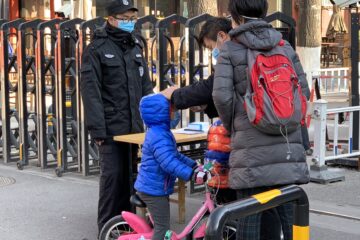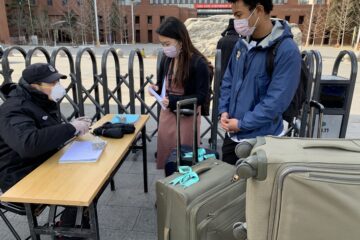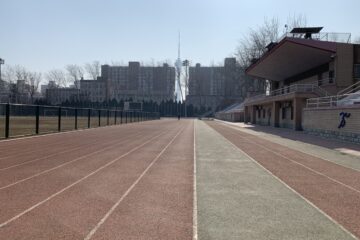Update Friday, February 21, 11:20 p.m.: As of 11:32 a.m. Beijing time on February 22, 76,394 confirmed cases of the novel coronavirus have been found in China, with 5,365 suspected cases and 2,348 deaths. 20,674 individuals have recovered from the virus. Much has happened since the last update and I will do my best to summarize the latest changes as well as updates on the situation.
All Middlebury students affected by the suspension of the Schools in China have returned to the U.S. and have completed one week of classes, save for four students who will enroll in programs in Taiwan and Argentina. Students on campus have been invited to a dinner at the Chinese House on March 6. Dubbed “A Bite of China,” this dinner will feature dishes from Middlebury’s host cities in Beijing, Hangzhou and Kunming. We look forward to welcoming this group of students home and savoring the flavors of China. Programs in Taiwan start on February 26 (CET) and March 4 (ICLP).
In an email to the Middlebury community on Thursday, February 20, Executive Vice President and Provost Jeff Cason announced that “the College has decided it will not support any faculty, staff, or student travel to China through the end of summer 2020. This includes any travel supported through institutional funding (e.g., research, internships). The School of the Environment, which was to operate in China from early June to mid-July 2020, was suspended two weeks ago.” See the full message here.
With the influx in cases onboard the Diamond Princess cruise ship docked in Yokohama, Japan, some governments have evacuated citizens from the ship and the rest have now been released. Global cases of the coronavirus have spiked in Iran and South Korea, with four deaths having now been reported in Iran. According to Sixth Tone, China’s most important annual political meetings, the “two sessions,” may be postponed amid the ongoing COVID-19 epidemic, according to the official Xinhua News Agency. The potential move was proposed Monday by Li Zhanshu, chairman of the Standing Committee of the National People’s Congress. A final decision will come later. 34 cases have been confirmed in the U.S., with more expected. China’s prison system has also seen an influx in cases. A meeting of the Communist Party Politburo Friday said the Covid-19 epidemic in China has been tentatively contained but hasn’t yet reached a turning point, according to Caixin. World Health Organization officials will visit Wuhan on Saturday, February 22. Many travel restrictions still remain in effect, with flights both domestically and internationally at a low.
From reports from our contacts in China, Beijing seems to show some signs of life. While many malls remain empty, traffic seems to be present on some streets. In Kunming, bus and subway systems resume on February 22. Rail services have resumed as of February 17. People returning from more than 14 days outside of China as well as short-term visitors to the city will no longer be asked to observe a two-week quarantine, Beijing city officials announced this afternoon. According to Caixin, “The European Union Chamber of Commerce in China announced Friday it received updated quarantine rules from the Beijing Covid-19 Prevention and Control Office. It said that to be exempt from the quarantine, a traveler must be a foreign national; must have stayed at least 14 days outside of China before returning; must enter China through Beijing Daxing International Airport or Beijing Capital International Airport; and must have returned from another country on a direct flight. A transfer anywhere inside China would disqualify a person from exemptions.” At Avocado Tree, a popular Mexican restaurant chain in Beijing, masks are shipped with every food order. Schools at some universities in Beijing are starting online classes on Monday, February 24. Hangzhou bus services seem to also show signs of resuming.
Sixth Tone reports on a new revelation from a Chinese official. “‘It is possible for COVID-19 to become a chronic disease, coexisting with humans like a seasonal flu,’ Wang Chen, vice president of the Chinese Academy of Engineering and a specialist in respiratory diseases, told state broadcaster China Central Television. He added that the global community must take preparatory measures for such a future.” Zhao Jianping, the head of a team trying to control the outbreak in Hubei, has warned that recovered patients may also test positive and could be contagious. There is much the global health community still does not know about the virus. According to a public health professor at Middlebury, the ideal conditions for the virus to survive are still unknown. Whether or not the virus will “die out” in April, similar to the common cold and flu, is not completely clear. She also warned against infections in Africa given China’s heavy investment and flows of people, as the healthcare system there is ill-equipped to respond to such an outbreak.
The National Security Language Initiative for Youth (NSLI-Y), a U.S. Department of State program that provides merit-based scholarships for eligible high school students and recent high school graduates to learn less commonly taught languages, has suspended its programs in mainland China for the summer, according to an alumni post in a Facebook group. They intend to send some students to Taiwan; we will continue to gather more information about programs releasing updates for the summer.
We will continue to monitor the situation as it progresses and send out occasional updates with newer, larger pieces of information. The safety, security and health of all remains a top priority and we will only advise travel to China when the U.S. Department of State lowers the travel warning (which still remains at Level 4: Do Not Travel) and there is a steady supply of international flights moving in and out of the country.



1 Comment
Wuhan Coronavirus: Updates - Off the Silk Road · February 26, 2020 at 12:54 am
[…] Friday, February 21 […]
Comments are closed.